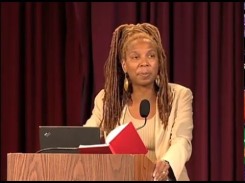July 6, 2018
I mentioned that I was developing a workshop on intersectionality on Twitter and one of my social justice-minded followers replied, “Why do you see yourself as a person who is qualified to lead a workshop about it?” The implication was, what would a straight white male know about intersecting forms of oppression? I deleted my snarky defensive reply that I almost posted, reigned in my white fragility, and worked her valid question into my workshop.
Intersectionality refers to the way forms of oppression can combine for people to create obstacles that are missed if we just look at things like racism or agism or homophobia in isolation. I’ve been lecturing about it for 20 years but recently learned it has an illustrative origin, which, like many important theoretical ideas, was born on a factory floor.

Kimberly Crenshaw, a UCLA law professor was reviewing a discrimination suit filed against General Motors by a group of black women. GM had the case dismissed because they argued that they actively hired both African-Americans and women so, you know, they were good. But Crenshaw learned that the African-Americans that were hired were black men on the factory floor and the women that were hired were white women in the clerical pool. Attempts to remedy racism and sexism didn’t help black women. Their experience was something else, the intersection of racism and sexism.
Sometimes I will ask my students to describe the experience of Asian-Americans. It’s a prompt that is not meant to have a response. There is no Asian-American experience because there is no monolithic Asian experience in America. To equate the lived experience of a fourth generation Chinese-American to someone whose family came from Cambodia in the 1970s or a Muslim from Malaysia or a Shinto from northern Japan is just silly. There are too many important variables to conceive of for even one unifying theme. Throw gender into the mix and it gets even more complex.
Speaking of, the roots of this idea were in the 2nd wave feminist movement when it became clear that “feminist issues” were really just the issues of middle-class white women who wanted to take on sexual harrasment in the workplace and the empty promises associated with suburban housewife drudgery. When women of color said, “Hey, we want to talk about our experiences, too, so we need to discuss racism!” the core (white) feminists said, “No, this is about sexism not racism. That meeting is down the hall.” This led scholar bell hooks to write the founding text of the issue in 1981, Ain’t I a Woman? Black Women and Feminism. In it she points out the convergence of racism and sexism was a key weapon of the slave traders to further devalue black women and persists to this day.

Intersectionality has all kinds of dimensions beyond race and gender. Class, gender identity, sexuality, immigration experience, and many other measures add to the mix. Think of how a poor white male experiences white privilege or masculinity differently than a rich white male. Is a gay person with a physical disability going to experience their sexuality the same way as a non-disabled gay person? I can tell you that an undocumented immigrant who is white (like the 50,000 undocumented Irish in America) have it a hell of a lot easier than the undocumented people who are brown. Think of it as a complex Venn diagram where each intersection produces something unique, like the varied ingredients of a smoothie. And typically that smoothie tastes like multiple forms of oppression.

There’s a lot of blowback on the topic, mostly from white men. Just put “intersectionality” into a YouTube search and see the dumb videos dedicated to “debunking” the actual experiences of others. They scream “Identity politics!” which is a common refrain among those trying to keep the playing field uneven and privileging themselves. Intersectional thinking is actually the opposite of identity politics. It recognizes what is unique about each of our struggles. A first-generation South Asian immigrant who is also Muslim, female, and gay is not served by being put into just one demographic box and should not have to pick any single identity. (“On Mondays I’m an immigrant. Tuesdays are gay days…)
The reason this matters is that marginalized people who have these intersections are even more marginalized because of them. People want to be seen and heard not pushed into the shadows even further. I’m doing these workshops because this has a real impact in the workplace. One study found that people who feel they can be their authentic selves at work are three times more likely to say they are proud to work at the company or agency and more than four times likely to say they feel empowered to do their best work. Being intersectional is good for business! That should get straight-white-male capitalist’s attention.
It’s easy for straight-white-males to dismiss this important issue. What a hassle to have to learn all these new feminist terms, right? I mean, it doesn’t affect them. Or does it? Good news, fellas, everyone is intersectional. Oppression intersect but so do privileges AND oppressions and privileges.

In this workshop I used myself as example of the intersection of three identities; white, male, and Southern. As a child I learned being a southerner was devalued and did my best to lose any hint of a southern accent. (If you want to hear it, buy me a shot of Jack Daniels.) My whiteness intersects with my Southernness – Southern whites are supposed to be racist and pine for “Dixie.” My maleness also intersects with my Southernness – Southern men learn violence and anti-intellectual posturing at an early age. So you can imagine the learned identity when you put all three together. And that is my struggle that a white male from Oregon might not see.
We’re working at the next level of anti-racism and bigotry here. This isn’t about segregated schools and lunch counters. When we get to addressing micro-aggressions, implicit bias, privilege, and intersectionality, we’re making real progress. There will be the usual pushback from those who have a vested interest in not making equity a reality (“Hey, they had Obama for eight years!”), but I think even those folks can be brought into the conversation. When people are allowed to exist in their own skin, as complicated as it might be, everyone is happier.
Interestingly, I was told by a friend who is a white gay pagan man from Appalachia that being Irish worked against the immigrants when slavery was around in the US, since slaves were ‘property’ so others could not harm or kill them without repayment to the ‘owners’, but poor Irish were just poor and not defended by anyone. That was a different variant on intersectionality, with economics and class and religion thrown in. I hope we all smarten up now for the benefit of all.
LikeLiked by 1 person
just to throw a wrench into the mix. the elderly looked upon as not worthy of anyone’s time. used to be the old were considered wise with much to offer the world. no more, just ask me, i am 80. apparently my opinions on any subject are given no merit. i am dismissed at every turn. how do we change that? we are to old to march. even if we could would be looked on as crazy. so there you have, we are victims a well.
LikeLike
“When people are allowed to exist in their own skin, as complicated as it might be, everyone is happier.”
I find that statement false because if you are a straight, white male who is proud of not what you are but who you are, you’re deemed a racist. I’ve heard said, “if you say you’re not a racist, that makes you a racist. If you call yourself a racist, then you’re a racist.” It’s a negative/positive. It seems you should be and feel ashamed of being white. The more that keeps being said, the more people are going to resist.
I want you to think back to Vietnam. When our troops came home, they couldn’t get a break. If they said anything about being a Vietnam veteran, they were treated lower than the dead are buried. It took them nearly three decades to finally say anything about them being in Vietnam )I know this because my father was one of who had the rarest brain tumor at that time which was caused by Agent Orange). There was NOTHING to offer for our troops returning home from war. Sure, there’s more to offer them today than there was in the 90’s.
The point is rather than criticizing, protesting, name calling, or degrading, there are different measures that can be used without a negative attitude.
LikeLike